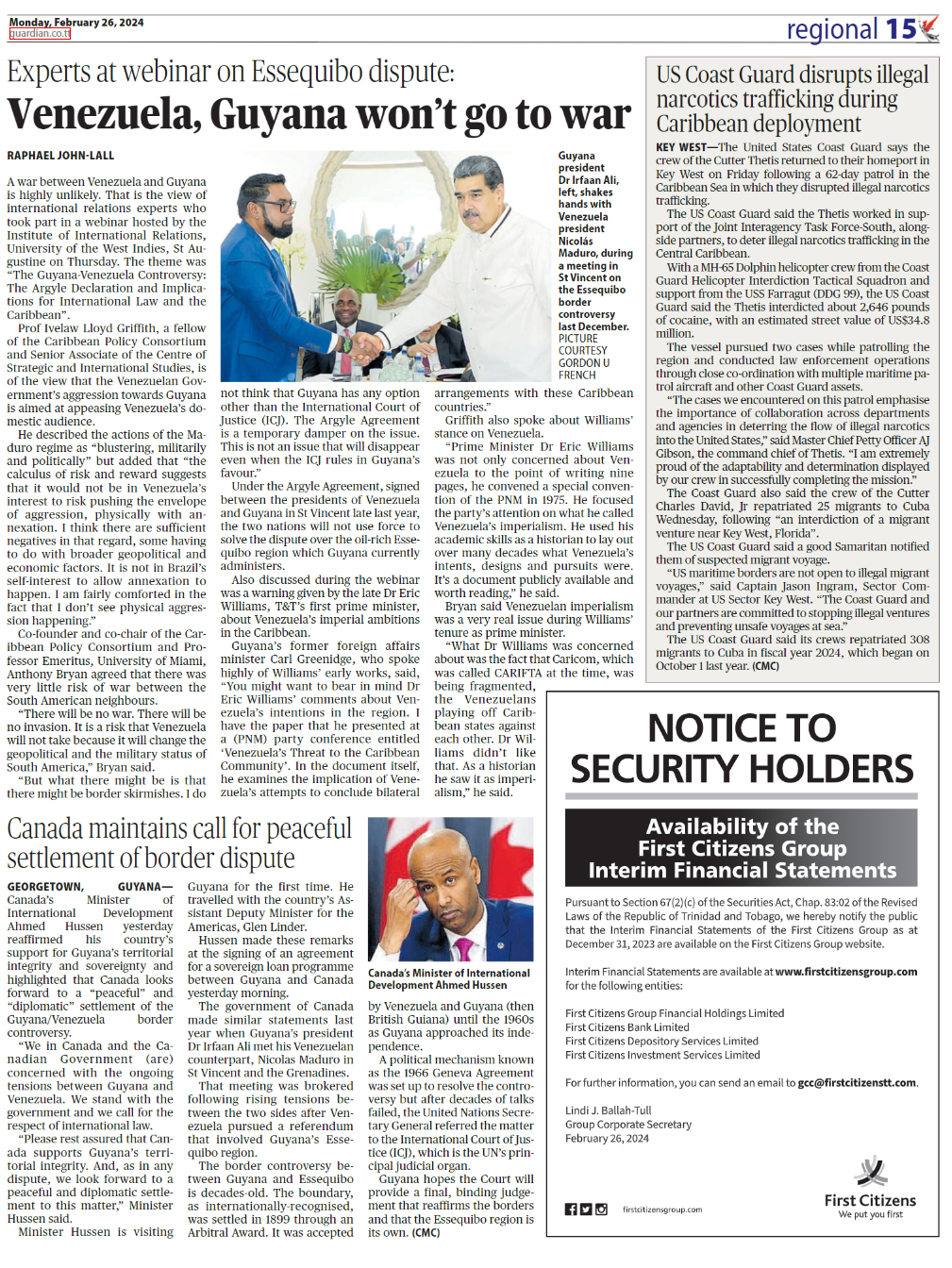Venezuela, Guyana won’t go to war
Experts at webinar on Essequibo dispute:
RAPHAEL JOHN-LALL
A war between Venezuela and Guyana is highly unlikely. That is the
view of international relations experts who took part in a webinar
hosted by the Institute of International Relations, University of the
West Indies, St Augustine on Thursday. The theme was “The
Guyana-Venezuela Controversy: The Argyle Declaration and
Implications for International Law and the Caribbean”
Prof Ivelaw Lloyd Griffith, a fellow of the Caribbean Policy
Consortium and Senior Associate of the Centre of Strategic and
International Studies, is of the view that the Venezuelan
Government’s aggression towards Guyana is aimed at appeasing
Venezuela’s domestic audience.
He described the actions of the Maduro regime as “blustering,
militarily and politically” but added that “the calculus of risk and
reward suggests that it would not be in Venezuela’s interest to risk
pushing the envelope of aggression, physically with annexation.
I think there are sufficient negatives in that regard, some having to
do with broader geopolitical and economic factors. It is not in
Brazil’s self-interest to allow annexation to happen. I am fairly
comforted in the fact that I don’t see physical aggression
happening.”
Co-founder and co-chair of the Caribbean Policy Consortium and
Professor Emeritus, University of Miami, Anthony Bryan agreed
that there was very little risk of war between the South American
neighbours.
“There will be no war. There will be no invasion. It is a risk that
Venezuela will not take because it will change the geopolitical and
the military status of South America,” Bryan said.
“But what there might be is that there might be border skirmishes.
I do not think that Guyana has any option other than the
International Court of Justice (ICJ). The Argyle Agreement is a
temporary damper on the issue.
This is not an issue that will disappear even when the ICJ rules in
Guyana’s favour.”
Under the Argyle Agreement, signed between the presidents of
Venezuela and Guyana in St Vincent late last year, the two nations
will not use force to solve the dispute over the oil-rich Essequibo
region which Guyana currently administers.
Also discussed during the webinar was a warning given by the late Dr Eric Williams, T&T’s first prime minister, about Venezuela’s
imperial ambitions in the Caribbean.
Guyana’s former foreign affairs minister Carl Greenidge, who
spoke highly of Williams’ early works, said, “You might want to
bear in mind Dr Eric Williams’ comments about Venezuela’s
intentions in the region. I have the paper that he presented at a
(PNM) party conference entitled ‘Venezuela’s Threat to the
Caribbean Community’. In the document itself, he examines the
implication of Venezuela’s attempts to conclude bilateral
arrangements with these Caribbean countries.”
Griffith also spoke about Williams’ stance on Venezuela.
“Prime Minister Dr Eric Williams was not only concerned about
Venezuela to the point of writing nine pages, he convened a special
convention of the PNM in 1975. He focused the party’s attention on
what he called Venezuela’s imperialism. He used his academic
skills as a historian to lay out over many decades what Venezuela’s
intents, designs and pursuits were.
It’s a document publicly available and worth reading,” he said.
Bryan said Venezuelan imperialism was a very real issue during
Williams’ tenure as prime minister.
“What Dr Williams was concerned about was the fact that Caricom,
which was called CARIFTA at the time, was being fragmented, the
Venezuelans playing off Caribbean states against each other. Dr
Williams didn’t like that. As a historian he saw it as imperialism,”
he said.
Photo: Guyana president Dr Irfaan Ali, left, shakes hands with Venezuela
president Nicolás Maduro, during a meeting in St Vincent on the
Essequibo border controversy last December.
PICTURE COURTESY GORDON U FRENCH

